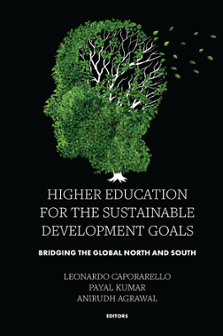
Index
Higher Education for the Sustainable Development Goals: Bridging the Global North and South
ISBN: 978-1-80382-526-7, eISBN: 978-1-80382-525-0
Publication date: 4 December 2023
Citation
(2023), "Index", Caporarello, L., Kumar, P. and Agrawal, A. (Ed.) Higher Education for the Sustainable Development Goals: Bridging the Global North and South, Emerald Publishing Limited, Leeds, pp. 195-200. https://doi.org/10.1108/978-1-80382-525-020231014
Publisher
:Emerald Publishing Limited
Copyright © 2024 Leonardo Caporarello, Payal Kumar and Anirudh Agrawal
INDEX
(see also Shared leadership)
- Prelims
- Chapter 1: Research from The Global North and South on HEIs as A Driver For SDGs
- Theme One: Global Higher Education Landscape
- Chapter 2: How Do Higher Education Institutions Manage Biodiversity? Exploring The Current State from Universities in Global North and South
- Chapter 3: Higher Education and Sustainable Development: A Literature Analysis and Conceptual Overview
- Chapter 4: Higher Education for Sustainable Development Goals: Bridging the Global North and South
- Chapter 5: Higher Education Institutions as Partners in Multi-Sector Collaborative Initiatives for Integration of SDGs in Tourism
- Chapter 6: The Role of Shared Leadership in Realizing SDGs: An Exploration of Intra-Country Collaborative Work Between HEIs and Public Policy Groups in Zambia
- Theme Two: Rethinking Curriculum and Learning
- Chapter 7: Building Sustainability Leadership: Rethinking Curriculum Design and the Role of the Faculty
- Chapter 8: Skill Integration in Higher Education: Curriculum for Sustainability
- Chapter 9: Experiential Learning About Sustainable Development and The SDGs: Features, Challenges, and Experiences of A Modular Course in Business Education
- Chapter 10: Understanding the Mediating Role of Peers' Feedback on Team-Based Learning and Career Planning Skills
- Index